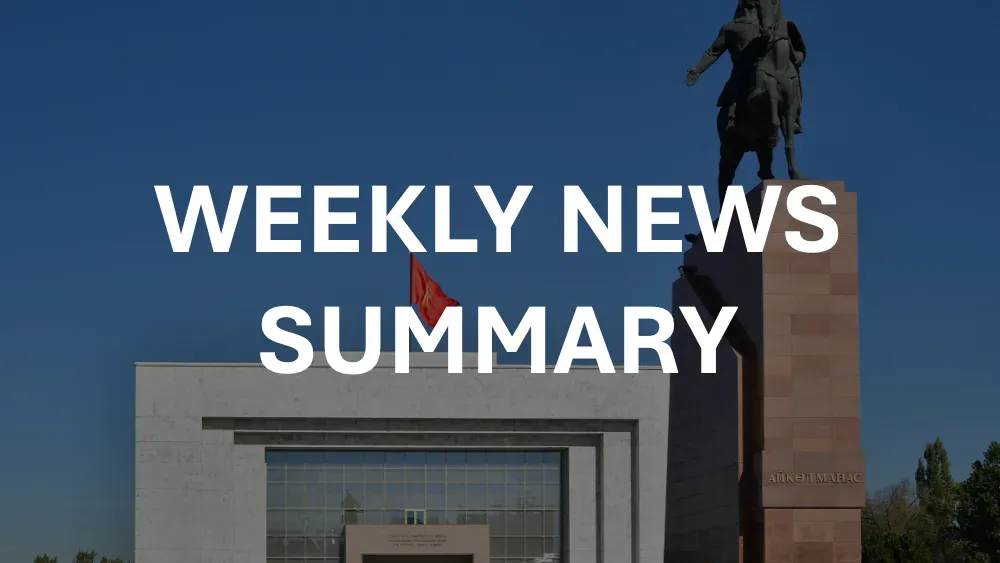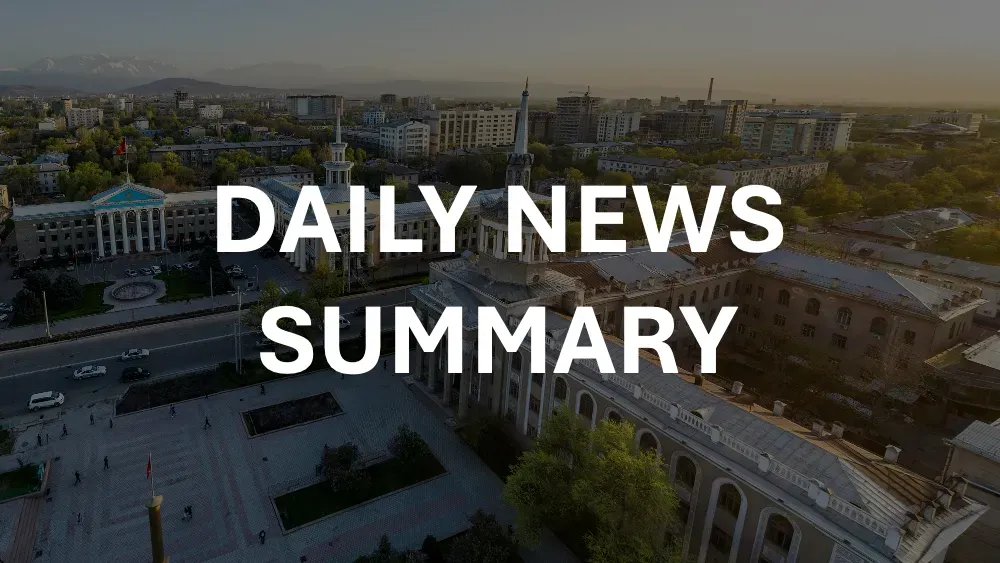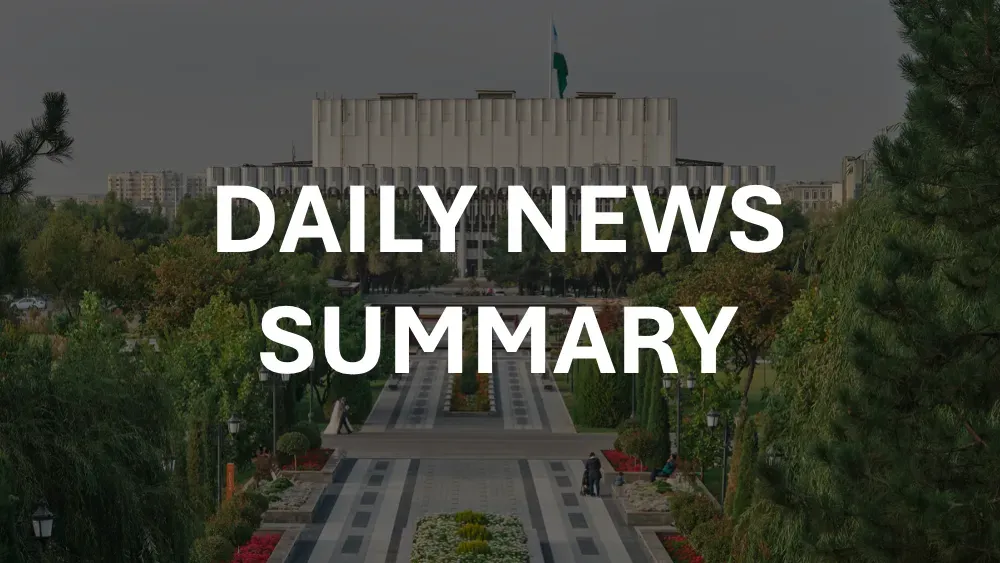This weekly digest showcases just 10 stories. Daily subscribers receive comprehensive intelligence briefs with 40 of the top stories organized by category. Don't miss the stories that matter.
Subscribe to Daily →
October 31, 2025 to November 6, 2025
This week's top 10 stories from Kyrgyzstan, selected from our daily intelligence briefs.
1. Japarov Arrives in Washington for C5+1 Leaders’ Summit and Planned Bilateral with Trump
Kyrgyz President Sadyr Japarov arrived at Joint Base Andrews on a U.S. working visit at the invitation of President Donald Trump to take part in the C5+1 leaders’ summit marking the platform’s 10th anniversary and to hold a planned bilateral with Trump. The summit in Washington convenes the five Central Asian presidents (Kazakhstan, Kyrgyzstan, Tajikistan, Turkmenistan, Uzbekistan) and will emphasize security, connectivity and economic ties; Japarov was formally received by Assistant Secretary for South and Central Asian Affairs Paul Kapur, reflecting the protocol weight of the visit.
Bilateral preparatory talks between Kyrgyz Ambassador Aybek Moldogaziev and Kapur reviewed political dialogue, trade and investment priorities and coordination for joint U.S.–Central Asia activities, though no concrete initiatives or timelines were announced. Analysts (notably Shairbek Zhoroyev of Crossroads Central Asia) expect U.S. aims to include access to Central Asia’s mineral resources, participation in transit projects such as the Middle Corridor, and scrutiny of sanctions compliance — signaling sustained symbolic engagement but underscoring that Washington will need deeper private investment to rival China’s economic footprint in the region.
Local Coverage: kabar.kg, sputnik.kg, 24.kg, kyrgyztuusu.kg, azattyk.org
From daily briefs: 2025-11-04, 2025-11-05, 2025-11-07
2. Policy Priorities Flagged for U.S. Engagement: Visa Access, Banking Sanctions, and Investment Outreach
Local experts are urging Kyrgyz authorities to recalibrate engagement with the United States around three priorities: reassessing U.S. sanctions on Kyrgyz banks, easing tightened U.S. visa procedures for Kyrgyz citizens, and actively courting American investment. Analysts warn that banking sanctions have raised compliance costs and restricted cross-border transactions, while stricter visa issuance has reduced academic, business and cultural exchanges; they recommend clearer communication and technical consultations with U.S. counterparts to mitigate de‑risking in the financial sector and restore trade and education channels.
The investment push targets diversification of funding and integration into higher‑value global supply chains but is contingent on improved legal predictability and risk‑management frameworks to reassure U.S. partners. The article gives no official government response or implementation timeline.
Local Coverage: azattyk.org
From daily brief: 2025-11-07
3. Power Buildout Accelerates to 2030 with 30 New Generation Projects and CASA‑1000 Export Link
The government has accelerated a major power buildout to close winter deficits, bolster energy independence and enable exports via the CASA‑1000 corridor, targeting nearly 30 new generation assets by 2030. Hydropower remains central—currently >85% of generation—with the flagship 1,860 MW Kambar‑Ata‑1 HPP advancing rapidly (access roads, tunnels and substation largely complete); first unit could be online in 2028–2029 and full completion is targeted for 2032. Kambar‑Ata‑2 is moving forward under Chinese‑Korean consortium contracts, while five small HPPs (total 41.29 MW) were commissioned this year and additional small hydro plus solar and wind projects are in the pipeline, including investment agreements for five solar plants totalling 3,150 MW and one wind site.
Grid and export infrastructure tied to CASA‑1000 are being upgraded to permit regional green‑power exports to Afghanistan and Pakistan as early as 2027, and workforce training is being scaled to support delivery. For international stakeholders, the program signals sizable near‑term capacity growth concentrated in large hydro, a material solar pipeline, and export potential that could shift regional power balances—subject to timely completion of Kambar‑Ata phases, grid enhancements and cross‑border agreements.
Local Coverage: kabar.kg
From daily brief: 2025-11-04
4. EAEU Inflation Pressures Intensify as Kyrgyz Central Bank Hikes Policy Rate to 10%
Consumer prices in the Eurasian Economic Union rose across all member states in September 2025 versus August, with Kazakhstan posting the bloc’s highest year‑to‑date consumer inflation at 10.0% since December 2024 (food +9.9%, non‑food goods +8.0%, services +11.9%). Kyrgyzstan’s inflation stood at 6.2% year‑to‑date and 8.4% year‑on‑year; strong real GDP growth of 10% in the first nine months was driven by robust consumer and investment demand, fiscal stimulus and rising remittances.
In response to persistent inflationary pressures and elevated external uncertainty, the National Bank of the Kyrgyz Republic raised its policy rate to 10% on 27 October to steer medium‑term inflation toward the 5–7% target range. Real wages are currently outpacing inflation in Kyrgyzstan and Belarus (but not Kazakhstan). Social measures accompanied the tightening stance: from 1 October Kyrgyzstan increased pensions by 18% (at least KGS 1,000), covering more than 818,000 pensioners. These dynamics highlight a policy trade‑off across the EAEU between supporting growth and containing inflation amid volatile global energy and food prices.
Local Coverage: kabar.kg
From daily brief: 2025-10-31
5. Bishkek and Beijing Expand Police Cooperation on Transnational Crime and Security
Kyrgyzstan and China have agreed to deepen cooperation between their interior and public security agencies, prioritizing joint action against transnational crime, cybercrime, terrorism, extremism and separatism. Interior Minister Ulan Niyazbekov, speaking after talks with Chinese Ambassador Liu Jiangping, emphasized existing effective channels with China’s Ministry of Public Security, citing exchanges of professional expertise, coordinated operations and joint training to strengthen operational capacity.
The timing is notable: Niyazbekov linked the security agenda to Kyrgyzstan’s upcoming 2025–2026 chairmanship of the Shanghai Cooperation Organization, suggesting Beijing and Bishkek aim to leverage bilateral law‑enforcement ties for broader regional coordination across security, economic and humanitarian areas. For international professionals, the move signals intensified China‑led security governance in Central Asia and a likely increase in operational information‑sharing and joint activities affecting cross‑border policing and cyber operations.
Local Coverage: kabar.kg
From daily brief: 2025-11-05
6. Special Financial-Investment Zone Planned at Tamchy to Attract Capital and Build Innovation Hub
Kyrgyzstan’s Cabinet announced plans to establish a special preferential financial‑investment zone in Tamchy to attract capital, expand the financial sector and seed an innovation hub, Deputy Prime Minister Daniyar Amangeldiev said at the National Development Forum–2030. The initiative is framed within a broader national strategy to position the country as a competitive Central Asian investment center focused on export‑led and sustainable growth; measures include a national venture fund for the creative industries, targeted support for youth entrepreneurship and startups, digital financing mechanisms, expanded lending instruments and modernized financial infrastructure.
The program also links the Tamchy zone to regional development priorities and large‑scale projects—cited examples include Batken‑City, new export logistics hubs and more efficient mining resource utilization—signalling a coordinated push to channel investment into both innovation ecosystems and tangible infrastructure. For international investors and development partners, the package suggests opportunities in fintech, creative‑sector finance and infrastructure financing, while execution risks will hinge on the concrete regulatory regime, timelines and implementation capacity announced by the government.
Local Coverage: kabar.kg
From daily brief: 2025-10-31
7. National Plan Sets 2030 Targets: Per‑Capita GDP to $4,500, Growth at 8%, Debt Capped at 60% of GDP
At the National Development Forum in Bishkek, Cabinet Chairman Adylbek Kasymaliev presented Kyrgyzstan’s 2030 economic targets under President Sadyr Japarov’s national program: raise per‑capita GDP to $4,500, expand total GDP to at least $30 billion, sustain average real growth of 8%, improve the Human Development Index by 10 ranks, keep unemployment ≤5%, and cap external public debt at 60% of GDP. Kasymaliev cited recent momentum—nominal GDP exceeded 1.5 trillion som in 2024 and nine‑month 2025 growth reached 10% (three‑year average >9%)—and announced a shift from an 853‑item 2026 plan to a 919‑measure program through 2030 to operationalize the targets.
Deputy Chair Daniyar Amangeldiev said the plan prioritizes industrial policy, SME support, financial‑market upgrades and regional infrastructure (industrial technoparks, clusters) to deepen processing and boost exports. The government aims to raise fixed‑capital investment’s share from 34% to 50% and lift SMEs’ contribution to GDP to 50% by 2030, backed by startup ecosystem unification, 25 local technology prototypes, certification reforms and expanded concessional leasing, lending and subsidies—policy choices that signal a pivot toward value‑added growth and regional job creation but will require sustained financing and institutional capacity to meet the stated debt and growth ceilings.
Local Coverage: kabar.kg, sputnik.kg
From daily brief: 2025-10-31
8. Online Voting Piloted in Jayyl District as Constituency Boundaries Shift for 2025 Parliamentary Elections
Kyrgyzstan’s Jayyl-based No. 17 constituency has been reconfigured ahead of the November 30, 2025 parliamentary elections: it now includes parts of Talas District, while nine precincts from Yntymak and Ak-Bashat were transferred to Moscow District. The constituency comprises about 140,000 registered voters served by 102 precinct commissions across Kara-Balta, Panfilov and four rural councils of Jayyl, and officials report equipment has been tested three times and commission staff trained to ensure operational readiness.
A major procedural change is the pilot introduction of online voting that allows voters temporarily outside their home region to cast ballots for candidates in their own constituency by presenting a passport at any polling station nationwide on election day, without prior application; intra-constituency transfers, however, remain prohibited. Election authorities, including Tursungul Beshkempiriva, Chair of the No. 17 Territorial Election Commission, stress transparency and security in the rollout — a development that could affect turnout, diaspora participation, and administrative logistics if expanded beyond this pilot.
Local Coverage: turmush.kg
From daily brief: 2025-11-05
9. EAEU FDI into Kyrgyz Republic Rises in H1, Led by Russia and Kazakhstan
Foreign direct investment from Eurasian Economic Union (EAEU) members into the Kyrgyz Republic rose to $171.3 million in H1 2024, up from $137.7 million a year earlier, the National Statistics Committee reports. Russia was the largest investor at $106.3 million, followed by Kazakhstan with $63.9 million; smaller inflows included Belarus ($1.1 million) and Armenia (reported $45.5 million). Officials noted multi‑fold increases from Belarus and Kazakhstan, underscoring deeper capital ties within the EAEU and continued reliance on Russian and Kazakh financing for sectoral projects.
The data aligns with broader industrial momentum: Kyrgyzstan posted the fastest industrial output growth in the EAEU (11.5% Jan–Aug 2024), ahead of Kazakhstan (7.6%), and its light‑manufacturing exporters remain heavily oriented to EAEU markets. In the first eight months, Kyrgyz sportswear exports totaled 248,000 units (Kazakhstan 185,200; Russia 51,100), with only token shipments to EU markets. For international investors and logistics planners, the figures point to predictable customs and regulatory frameworks within the EAEU and expanding production capacity, but limited diversification of export markets and exposure to volatile, smaller member‑state flows.
Local Coverage: sputnik.kg
From daily briefs: 2025-11-01, 2025-11-05, 2025-11-07
10. EAEU Co-Production and China–Kyrgyzstan–Uzbekistan Rail Seen as Path to Cut Import Dependence
Economist Ulukman Mamytov urged Kyrgyz policymakers to use the planned China–Kyrgyzstan–Uzbekistan railway not merely as a transit corridor but as the backbone for export-oriented manufacturing that reduces Kyrgyzstan’s heavy import dependence—estimated at $2.5–3 billion annually—which he says weakens the som and fuels inflation. Mamytov proposes two complementary tracks within the Eurasian Economic Union (EAEU): joint factories with Russia and Kazakhstan to scale processing and industrial output, and routing those goods to external markets via the new rail link; he also suggests that expanded production and targeted infrastructure upgrades could support higher-spending tourism, amplifying economic gains.
Local Coverage: sputnik.kg
From daily brief: 2025-11-04
About This Weekly Digest
The stories above represent the most significant developments from Kyrgyzstan this week, selected through our AI-powered analysis of hundreds of local news articles.
Stories are drawn from our daily intelligence briefs, which synthesize reporting from Kyrgyzstan's leading news sources to provide comprehensive situational awareness for international decision-makers.
These weekly highlights are a small sample of what's happening. Daily subscribers get comprehensive briefings with 40 top stories that connect the dots between events, track developing stories, and provide the context you need for informed decision-making.
Upgrade to Daily →






